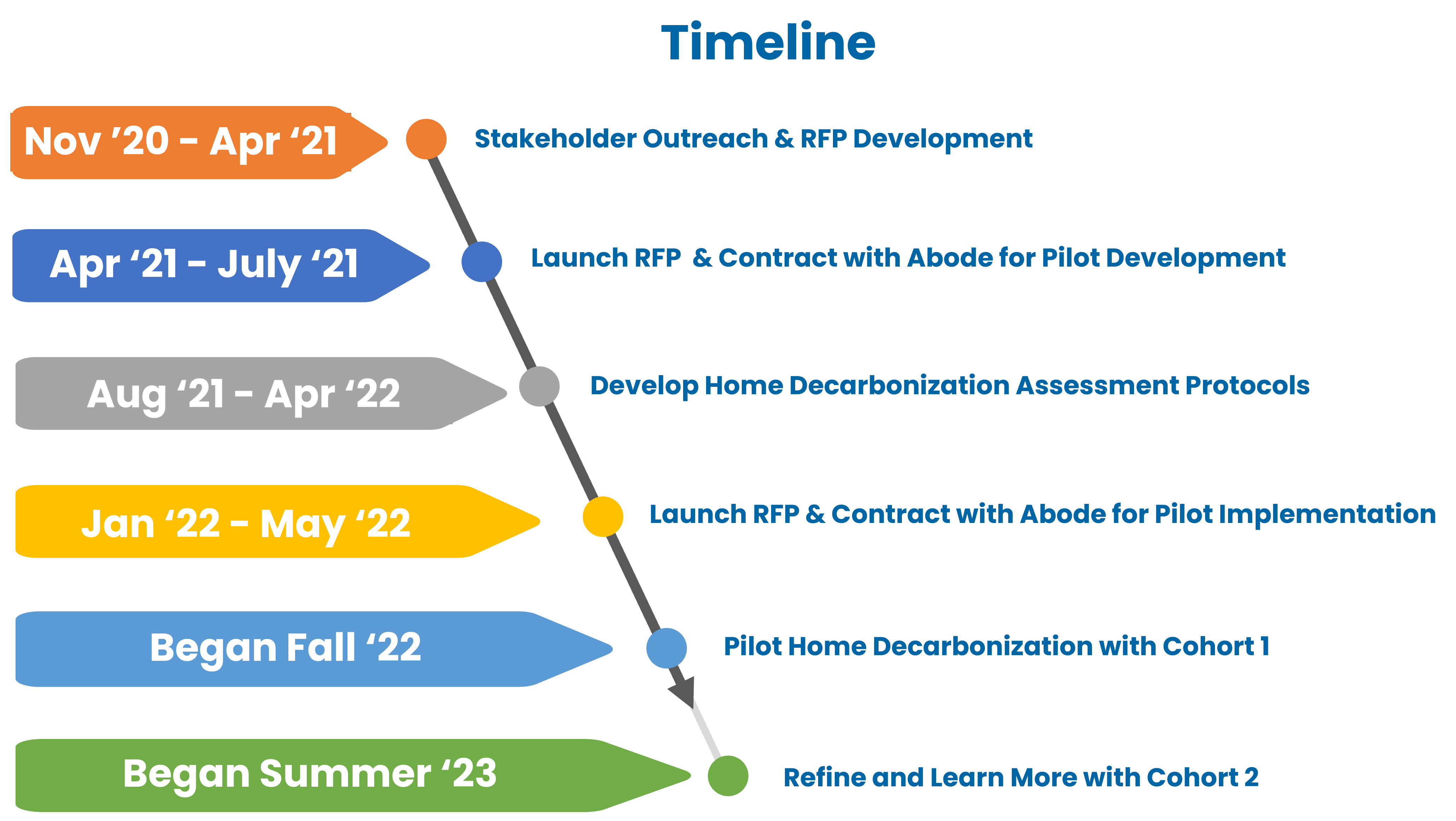
The Challenge: Develop Scalable Pathways for Home Decarbonization
Every home is different. Individual homes' clean energy potentials are vastly different, too. Homeowners need customized recommendations for comprehensive energy efficiency and home decarbonization projects. To serve a significant number of homes, program administrators and other practitioners need scalable protocols for assessing homes and developing the decarbonization plans.
About the Decarbonization Pathways Pilot
Through the Decarbonization Pathways Pilot, MassCEC is developing and testing an innovative protocol for comprehensive home decarbonization assessments for single-family and low-rise residential buildings (up to three stories). MassCEC plans to perform the newly developed assessment protocol on a diverse cohort of about 75 homes throughout the Commonwealth whose owners are interested in decarbonizing. In addition to the decarbonization assessment, participants will receive a decarbonization plan, technical assistance, and financial incentives to implement some or all of the recommended decarbonization measures.
If you would like to receive updates about the pilot, click here to be included on our mailing list.
Program Goals
The goals of the Decarbonization Pathways pilot program are to:
- Create and test a model for comprehensive consumer engagement and home decarbonization that could be scaled by Mass Save® or another entity — in service of achieving the state’s decarbonization targets
- Develop consumer-facing resources and showcases to support homeowners and landlords who are ready to take action now and decarbonize their buildings
The home decarbonization assessment will evaluate several areas — energy efficiency, electrical upgrades, heating and cooling, hot water, cooking & other appliances, and personal transportation — with the goal of eventually eliminating the use of fossil fuels from the home, in addition to promoting efficiency.
$10,000 - $30,000, subject to income qualification
Project Team
Technical Consultant
MassCEC is working with Abode Energy Management to conduct the following tasks:
- Develop protocols for a decarbonization assessment that build on the framework and successes of the Mass Save® Home Energy Assessment
- Create a framework for the recommendations that will come out of the assessment
- Produce a structure for customizable individual decarbonization plans based on the assessment's recommendations and the homeowner's goals
- Provide technical expertise for participants looking to implement decarbonization recommendations
Review Committee
MassCEC has assembled a committee of external experts to review and provide input on the decarbonization assessment protocols, recommendations, and customizable planning tool.
Committee members:
- Alissa Whiteman, MA Department of Energy Resources
- Amar Shah, Rocky Mountain Institute
- Andrew Posner, Capital Good Fund
- Andrew Winslow, Northeast Energy Efficiency Partnership
- Bob Eckel, Eversource
- Brendan Delaney, Action Inc.
- Brian Beote, Action Inc.
- Briana Kane, Cape Light Compact
- Frank Nitti, National Grid
- Greg Phipps, Reading Municipal Light Department
- Kristen Simmons, City of Boston
- Leah Berger, National Grid
- Nikhil Nadkarni, City of Cambridge
- Orest Manzi, Action for Boston Community Development
- Sophie Theroux, Holyoke Gas & Electric Department

Who's Eligible to Participate?
Eligible applicants are residential building owners of the following building types:
- Single-family home
- Multi-family building with four (4) or fewer units*
- Single owner or multiple owners
- All units in the building must participate
The Pilot is not intended for the following:
- Condos
- Commercial buildings
- New construction or homes built within the last ten (10) years
The home must also meet the following criteria:
- Must be located in a utility territory that contributes to the Massachusetts Renewable Energy Trust. This includes the Massachusetts service territory of National Grid, Eversource, Until, and municipal light plants that have elected to pay into the Renewable Energy Trust (please see masscec.com/municipal-lighting-plant-communities for more information).
- Must be an occupied residence year-round. For example, summer homes that are unoccupied in the winter are not eligible for the Pilot.
During the Pilot, Applicants should plan to, at a minimum:
-
Complete a package of measures (the “Home Modernization Package”) that ensure the home is well-prepared for full decarbonization by being adequately weatherized, having the needed electrical upgrades in place, and addressing any barriers to future decarbonization
- Plan to make one or more of the following home investments (“Major Measures”):
- Install a heat pump
- Upgrade the home’s envelope
Full program details and eligibility requirements are available in the Program Manual.
Apply
This program is currently closed. The following information is provided for reference only. Applications were accepted via an online portal. Copies of the application materials are provided here for reference only.
The program documents currently on this webpage are relevant for Cohort 2 only. If you are looking for the Cohort 1 program documents, please reach out to us at buildings@masscec.com.
Aplique
Proceso de Solicitud
Esta program no esta aceptando solicitudes en este momento. La información proporcionada aquí es sólo para referencia. Solicitudes fueron aceptadas por un portal en línea. Copias de documentos de solicitud se proporcionan aquí sólo para referencia.
Los documentos del programa en esta pagina de web son pertinentes solo para el Segundo Cohorte. Si buscas por los documentos del Primer Cohorte, por favor envienos un mensaje a buildings@masscec.com.
FAQs
Additional Resources
- View a video recording of the panel “Developing Scalable Pathways for Home Decarbonization” presented on February 15, 2022 at the Pre-Conference Showcase for BuildingEnergy Boston 2022. The discussion includes an update on the proposed decarbonization assessment protocols.
- Visit Abode's Participant Portal, which will provide more information about the application timeline, incentives, and how to schedule a decarbonization assessment.
- Questions? Please email us at buildings@masscec.com with “Decarbonization Pathways” in the subject line.
Additional Funding Opportunities
BETA: Project Planning
Each participating building will receive an electrification and decarbonization plan, including direction to financing options and a recommended implementation timeline.
Rolling
Triple Decker Retrofit Pilot
Affordable Housing: $160,000; Market-Rate: $70,000-$125,000 depending on project scope
BETA: Roadmaps
Custom electrification and decarbonization plan, including financing analysis
Rolling, deadline TBD